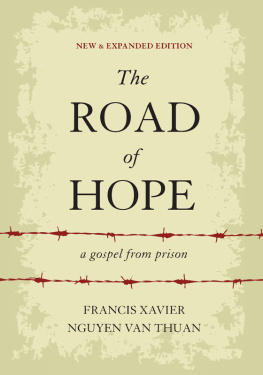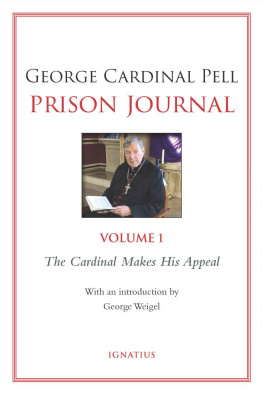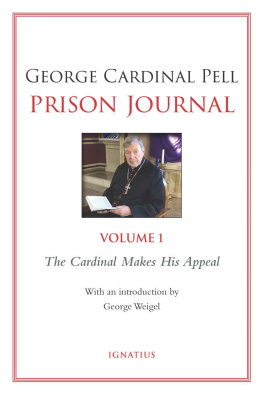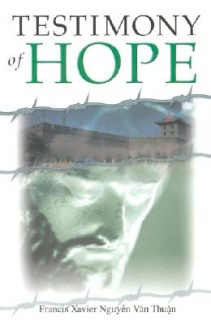The
ROAD
of
HOPE
2013 F. X. Nguyen Van Thuan
Original title in Vietnamese Duong Hy Vong
1992 F. X. Nguyen Van Thuan
1997 Translation and Introduction John Peter Pham
This edition published 2018 by Wellspring.
All rights reserved.
Published with Permission of
New City Press 202 Comforter Blvd., Hyde Park, NY 12538
www.newcitypress.com
No part of this book may be used or reproduced in any manner whatsoever without permission except in the case of brief quotations in critical articles or reviews.
Unless otherwise noted, Scripture passages have been taken from the Revised Standard Version, Catholic Edition. Copyright 1946, 1952, 1971 by the Division of Christian Education of the National Council of Churches of Christ in the USA. Used by permission.
All rights reserved.
Design by Madeline Harris
ISBN: 978-1-929266-56-2 (hardcover)
ISBN: 978-1-63582-096-6 (ebook)
10987654321
Printed in the United States of America
Seeing the crowds, he went up on the mountain, and when he sat down his disciples came to him. And he opened his mouth and taught them, saying:
Blessed are the poor in spirit, for theirs is the kingdom of heaven.
Blessed are those who mourn, for they shall be comforted.
Blessed are the meek, for they shall inherit the earth. Blessed are those who hunger and thirst for righteousness, for they shall be satisfied.
Blessed are the merciful, for they shall obtain mercy. Blessed are the pure in heart, for they shall see God. Blessed are the peacemakers, for they shall be called sons of God.
Blessed are those who are persecuted for righteousness sake, for theirs is the kingdom of heaven.
Blessed are you when men revile you and persecute you and utter all kinds of evil against you falsely on my account. Rejoice and be glad, for your reward is great in heaven, for so men persecuted the prophets who were before you.
Matthew 5:1-12
CONTENTS
INTRODUCTION
Francois Xavier Nguyen Van Thuan:
A Profile in Witness, Truth, and Mission
The Concept of the Martyr
When one pauses to consider the immensity of human misery inflicted by human beings on other human beings in our centurythe shocking crimes committed by individuals as well as nations, the mass extermination of peoples and the even crueler subjugation of others under the heel of totalitarianismthe difficulty of distinguishing Christian suffering from other forms of human misery, Christian victims from non-Christians becomes readily apparent. One might even ask whether there should be such a distinction.
This task is made all the more difficult by significant changes in the meaning of the once-specifically Christian designation of martyr. In the time of the early Fathers, the martyr was anyone who had testified to the truth of Christianity by steadfastness in faith despite hardships, peril, and even death. Later, although not always consistently, the designation became reserved for those who had sealed their faith with their blood during the persecutions. In either case, the use of the term martyr was limited to Christianity, and only to certain Christians at that.
There is no such reservation in modern usage. Gradually, any presumably innocent person killed on account of his religious, political, or moral convictions, whether a believer or not, became hailed as a martyr. Eventually, the person in question did not even have to die: he needed merely to demonstrate that he had experienced what is loosely defined as oppression. So the ranks of contemporary martyrs swell daily and range from the truly heroic (the Chinese student crushed by a tank in Tiananmen Square) to the downright banal (the self-styled artist who became a victim of censorship when he lost a government grant for some highly questionable works). Of these two changes, the second is acceptable insofar as it represents a return to an older tradition: the martyr is one who gives witness, even if he does not necessarily die in the process of proclaiming the truth. This is a particularly important development if humanity is to continue deriving inspiration from its martyrsthe increasingly delicate sensitivities of world opinion rarely permit outright murders any more, although systematic campaigns of oppression are occasionally ignored and allowed to run their course. The first change in concept, however, presents a problem for those seeking to differentiate Christian suffering from other human misery, the authentic Christian witness from other victims of modernity gone mad. Hans Urs von Balthasar attempted to resolve this difficulty in a little meditation written for the Eighty-fifth German Catholic Day in 1978, noting that:
If a Russian scholar, not wanting to submit to the degrading demands of the regime, puts up with the concentration camp or the insane asylum instead, then the proposition is evident to anyone: it is a matter of witnessing with ones life to the dignity and truth of the human being and of appealing to the conscience of humanity as a whole. But when a Christian dares to risk the same thing for his faith in Christ, the world knows, if it hears of the fact or pays attention to it, that the Christian suffers or dies for something that he regards as the all-sustaining truth of his life, something that, more profoundly than anything else, accounts for human dignity and human truth. Hence a martyrdom that is not only humanistic, but beyond that truly Christian, witnesses to the unabridged, integral New Testament faith. With this condition fulfilled, one witness to the faithwho genuinely lives his mission can accomplish more than a hundred professional missionaries routinely pursuing their trade.
We will never know the answer with certainty, but it would be interesting to speculate whether Father von Balthasar had ever heard of or paid any attention toand hence, by his own logic, drawn some inspiration fromone such Christian witness, whose life and work is concisely summarized by the Swiss theologian those three key words: Witness, Truth, and Mission.
Witness
That witness, Francois-Xavier Nguyen Van Thuan, was born on April 17, 1928, in Hue, then the imperial capital of Vietnam. Young Francois-Xavier was a scion of one of Vietnams oldest Catholic families. His branch of the great Nguyen clan, which could boast over three hundred years of the faith, had nearly been destroyed during the nineteenth-century persecutions of the fourth Nguyen emperor, Tu Due. At the time of his birth, however, the fires of persecution had long abated, although memories of the dark hours were still kept alive by relatives who had survived the ordeal.
Francois-Xaviers family fared well in those years and he was born into a privileged position in one of Vietnams most prominent families, which numbered among its members Ngo dinh Diem, first President of the Republic of Vietnam, and Pierre-Martin Ngo dinh Thuc, Archbishop of Hue, the boys uncles.
Despite the grand opportunities open to a young man from such a background, Francois-Xavier discovered a vocation to the priesthood, fired particularly by his youthful involvement in the Eucharistic Crusade, a popular Vietnamese Catholic movement promoting Eucharistic devotion and apostolic work during those years. He entered the Major Seminary at Hue and was ordained a priest on June 11, 1953. After several years of pastoral work, he was sent to Rome in 1956 to study canon law at the Athenaeum of the Propaganda Fide (now the Pontifical University Urbaniana), receiving his doctorate in 1959.










